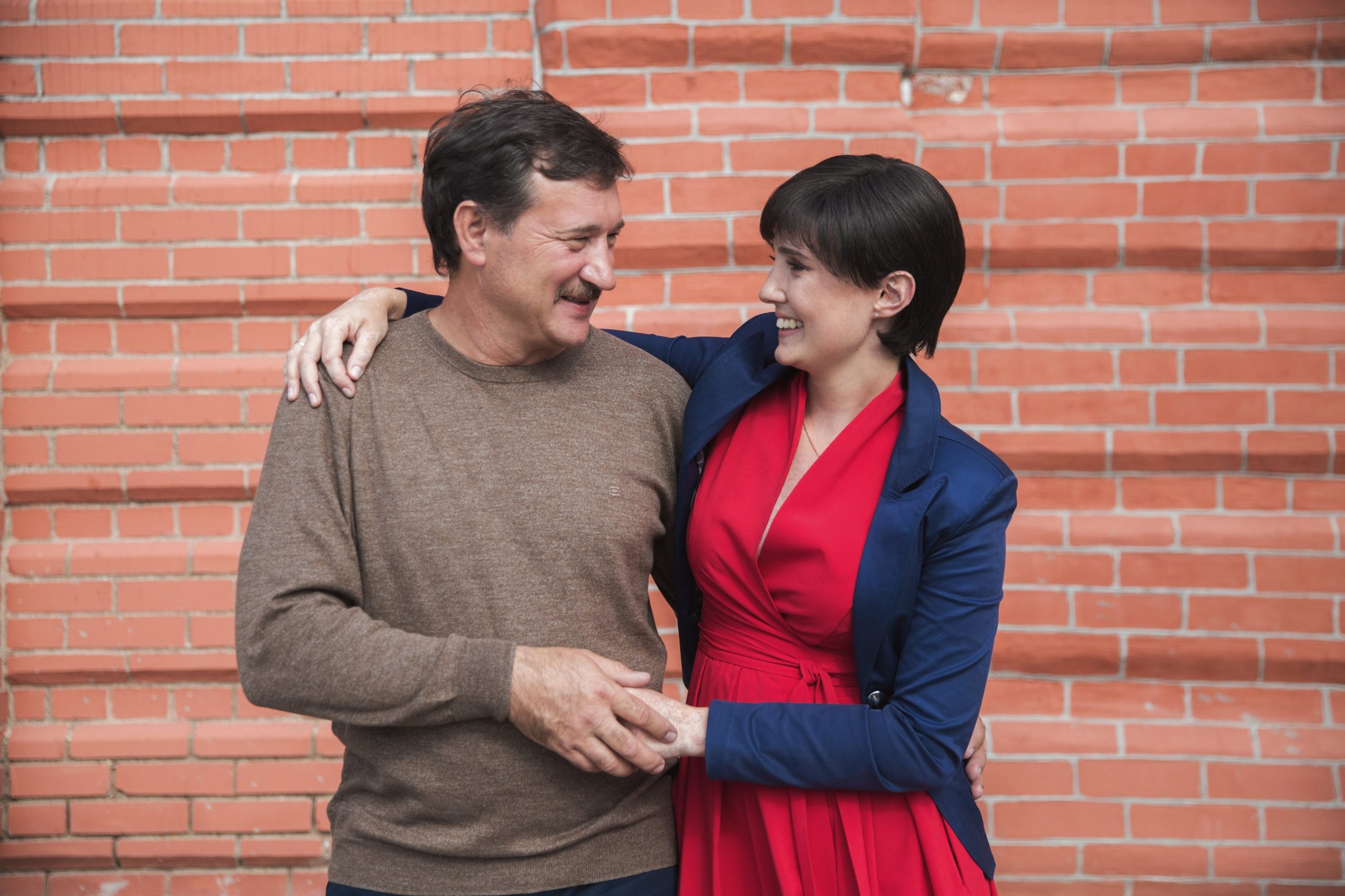The acute lymphoblastic leukaemia just wouldn’t go away. Elvira (Elya to her friends) went through treatment three times, had two relapses, and finally received a bone marrow transplant. Elya’s donor was her father Raul. This interview with a deeply beloved father and his hundred-percent-compatible daughter turned into a talk with the two people closest to each other. Please welcome the latest heroes of the Blood Family project, Elvira and Raul Abdulov.
Do you find it hard to talk about your illness?
Elvira: I can be relaxed when I talk about it. In part that’s because when I tell people about it, it’s as if it’s leaving me, and I feel lighter afterwards. In part, it’s because I know that the information might help somebody out there.
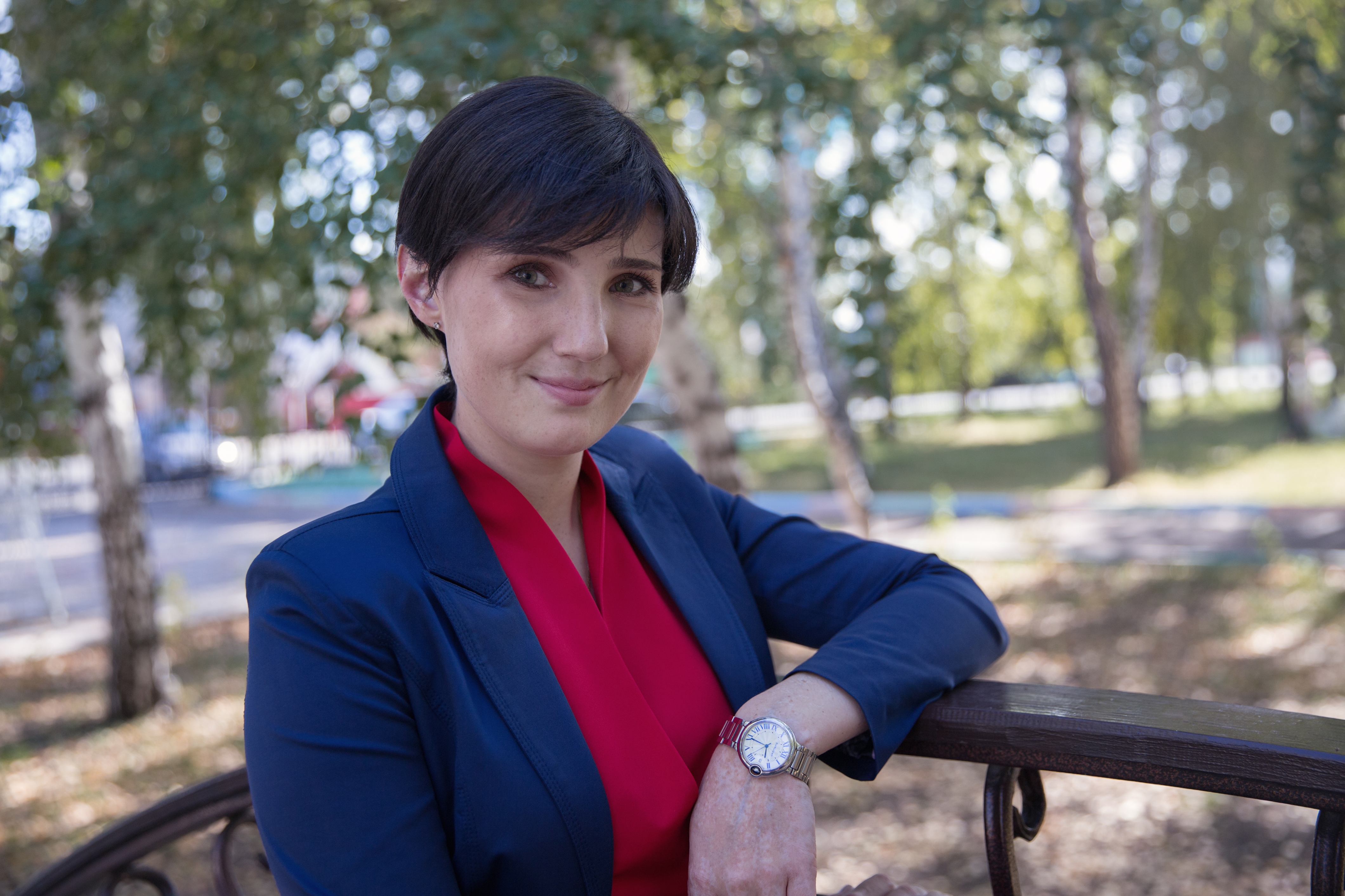
Elvira Abdulova
What do you recall?
Elvira: Depends on what we’re talking about. I got treated three times, and each time gave me new memories. After the transplant, it took me time to recover from the intense painkillers, and I just couldn’t get my mood to stay stable—sometimes I’d talk like normal, or laugh for no reason at all, and then see my dad and burst into tears.
Raul, do you remember that?
Raul: Of course I do. I walk into the ward, and suddenly she’s crying a river. There were many other touching moments as well. Back when Elya was starting to get better in the transplant ward, I caught a cold and couldn’t go to her sterile isolation room.
I remember how she’d write me little notes and put them up against the window: “Get better, Dad, keep at it.”
What was your relationship like before you fell ill?
Elvira: Everyone told me that I took after my dad, personality and everything. We were very close ever since I was little—not every girl can boast a dad like him! All my friends love him because he’s very caring. Maybe a little too caring! Somehow, he always understands everything. You can talk to him about whatever you like. I remember how my sister and I would keep running to him in tears over yet another boy, and he’d always listen. And then he’d find a way to fix any problem, to find a solution every time. That’s how it’s always been. Now, with Mum gone, we’ve grown even closer than that.
Raul: I’ve always told my girls that I’m their “damudoc”: Dad, Mum and doctor all in one package. So they can talk to me about absolutely anything.
How did you find out that Elya was ill?
Raul: It was a brutal shock. Elya was very into dancing at the time, and then she started complaining that she was getting tired quickly, saying she came home feeling completely drained. At first, I assumed it was because of her recent cold, that she was still getting better and hadn’t had a full recovery. Obviously, we went to get her a check-up… and the very next day, we were at the local children’s hospital. They took fluid samples, confirmed the diagnosis, and went straight into treatment. Elya developed a fungal infection, then pneumonia. She got sent to intensive care and spent eight days on artificial respiration. Honestly, it’s a miracle she made it out alive.
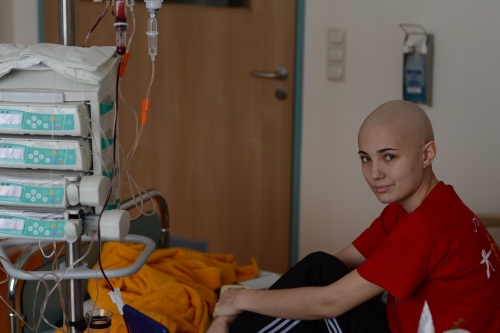
Elvira in hospital in Moscow
Did you talk to her about the illness?
Raul: Yes, once it was clear that she wouldn’t get better on her own and we’d have to throw everything we had into fighting off the illness, I told Elya everything. I already understood that what she needed was to step outside the life she knew and start living in a completely different way. Her primary treatment started in Moscow, where we went as soon as we had the chance.
Elvira: That’s right, it was a huge challenge to tear myself out of the active lifestyle I’d been used to. Up until the moment I fell ill, I was busy dancing, performing, training… whereas after intensive care it was all I could do to relearn how to keep my head upright, sit, walk and talk.
But when I realised that we were going to Moscow, I said that if I went into the hospital on my own two feet, then I’d make sure I came out on them too.
How did you feel when you arrived in Moscow?
Elvira: I knew that here I’d get all the help I needed. All around me, everything felt warm and bright. Then they told me about Kostya the clown, and I found myself longing to see him. And then he came the very next day after I arrived!
Raul: We had a very rough time in Ufa, but I’m grateful to my colleagues who gave their all for Elya’s sake. It’s through their efforts that Elya got out in one piece. My general view of disease is that it’s an enemy in a war we have no right to lose. We came to Moscow to win.
Elvira: I knew you were about to say that! As for me, I’d made up my mind that I wouldn’t celebrate New Year in hospital. And every time, right when December 29–30 was coming up, my test results would improve and they’d make sure to allow me a few days at home.
How did you come to be so determined?
Elvira: I don’t know. I hate to lose, and in general, I’m a terrible overachiever. I refuse to accept anything but the top grade. One of Dad’s mottos is that if you’re going to do something, do it well.
What do you think now about the illness, the treatment and everything that happened to you?
Elvira: I just finished medical school (first class degree, obviously) and did my graduation thesis on acute leukaemia, so I now know the subject backwards and forwards. That’s half my answer. The other half is that here’s what I think: if I had to go through that, then that’s how it had to be.
How long ago did you decide to go into medicine?
Elvira: Even before I fell ill. Ever since I was little, I’d play doctor, tag along with Dad on his shifts, and even sleep in the break room. I deeply regret not studying far enough to become a real doctor, only a mid-level practitioner, and that I don’t have the option of studying further.
But right now I need to be working on expanding my family, not thinking about a career as a doctor.
Would your own experience help work as a doctor?
Elvira: Right now, I don’t interact with patients. I’m a lab technician, since I needed to find a safe job without infections constantly going around. After I got better the first time, I thought it would never happen again, that life would return to its normal flow and everything would be great. I could move mountains. I gushed at people about myself. The second and third times hit me harder. For example, I don’t have hair anymore, and never will. That’s probably a consequence of all the chemotherapy, radiotherapy and GVHD (graft-versus-host disease). I have to wear a wig. There are times when I look at myself, burst into tears, and ask my husband why he loves me when I’m so unattractive. Then he spins his finger by his temple like I’m crazy, tells me I’m being silly, and that’s the end of it. He’s got this unique gift for snapping me out of feeling sad.
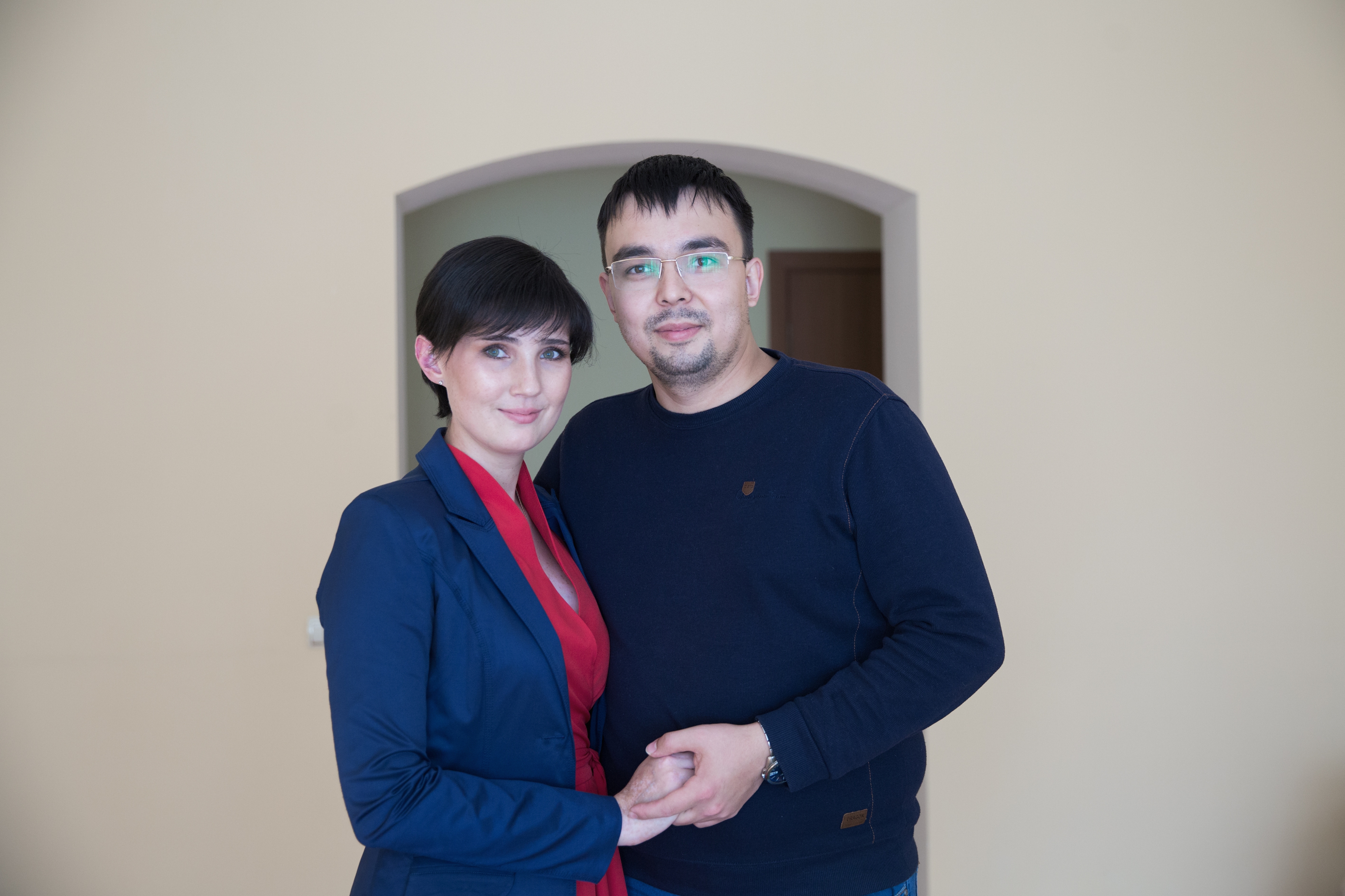
Elvira and Artur
Did you realise straight away that your dad would be the donor?
Raul: No, at first we looked for an unrelated donor, but we couldn’t find one. So they started to examine us more closely, and I was the best fit.
Has your relationship changed since you were ill?
Elvira: We’ve grown even closer. I was scared that I’d end up with a moustache after they gave me Dad’s cells.
Raul: That was our little joke. If the cells are mine, then the moustache will come with them.
What happened to your dancing?
Elvira: I was still into it as a hobby. But after the third time, I didn’t come back to it. If it wasn’t for the illness, maybe I’d have become a choreographer. Right now, I just need to get my health back so I can bear children.
So right now you’re completely focused on children?
Elvira: That’s my immediate plan. I’m capable of having children—that’s all back to normal now. When I was getting ready for the transplant, I was already eighteen, and I could sign my own documents. I knew in advance that there was the possibility of a lethal outcome. That was straightforward. But then I saw that terrible word: “infertility”!
Thank goodness my hormones have started to get back to normal levels half a year after the transplant. Now we’re just waiting for the doctors to give us the go-ahead for my body to be able to give life.
We promised our readers that we’d tell them about your wedding…
Elvira: I spent a whole year preparing for it. But first, let me tell you how Artur proposed. So he comes up to me, and I notice his hands are cold, and they only get cold when he’s anxious. We called a taxi, went to some house or other, and a girl met us and took us to the roof. There was a table, some fruit, and champagne. It was truly beautiful: sunset, swallows flying above us… And then Artur starts to say something, takes a little box out of his pocket—and I finally get what’s going on. Obviously, I say “yes”.
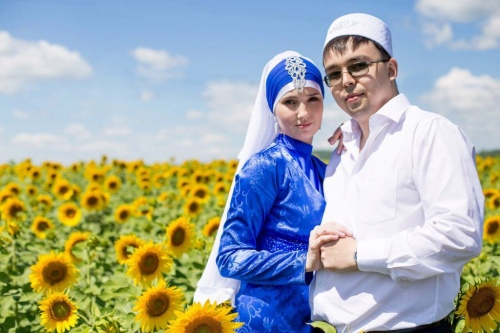
Elvira and Artur
And the wedding?
Elvira: Artur proposed in the spring, and I bought my dress as early as September. It was white as snow, with the halter neck to hide the spots that had developed after the GVHD. Lace, of course, and with one of those fichu shawls, like the ones cartoon princesses always have. And a diadem. And the wedding was on July 29.
What has Artur come to mean to you?
Elvira: Six years ago, he took me by the hand, and has never let go. He instantly made everyone fall in love with him, not just me but my dad and my sister too. We went through the third stage of my illness together. He was always by my side, and it meant everything to me.
Raul, what are your plans for the future?
Raul: Live to see my grandkids. Not long ago, I moved to the countryside. I got tired of city life and its constant hustle and bustle. I’ve built myself a house. That’s where I’ll be waiting for them.
Gift of Life thanks all donors and supporters! Together we give children and young people like Elya a better chance to beat cancer.
This is a short version of the interview. Read the Russian version here.

